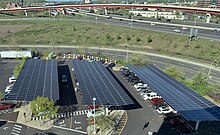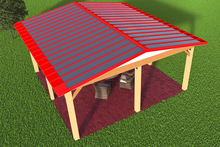Solar canopy



Solar canopies are
Solar canopy parking lots

The mounting structure makes solar canopy parking lots 50% to twice as expensive to build as traditional grass field solar arrays, but as
A French law passed in 2023 will require parking lots larger than 50,000 square feet (4,600 m2) to build solar canopies covering half their area. This could result in installed capacity of 6.75–11.25 gigawatts, at a cost of $8.7–14.6 billion.[2]
In 2022, the world's largest solar car park canopy opened in the Netherlands with 35 MW capacity.[3]
If
Community Solar
Solar canopies have a lot of potential when developing community solar. Community solar can easily implement solar canopy development to provide nearby residents with a reliable source of renewable energy. This is beneficial for residents wanting to invest in solar that do not have the means to construct panels on their own property.[7] The use of solar canopies in community solar allows more people to have easy and reliable access to renewable resources without as many limitations, such as funds or space, as personal solar panels.[7] This is due to the fact that solar canopies are constructed over preexisting parking lots and other open areas within the community rather than within one's own property. Additionally, the construction of solar canopies within communities helps to provide covered parking areas for residents and can be used for shade in parks and other open spaces that house solar structures.[7]
Gazebos
At

Tesla Supercharger stations with solar canopies
Some Tesla Supercharger stations have solar canopies installed to protect drivers and vehicles from the elements while recharging. Tesla Megapacks are also installed at some of these locations to store that energy locally.[9]
See also
Reference
- ^ "How to fight climate change with parking lots". YouTube. Archived from the original on 2024-01-03. Retrieved 2024-01-03.
- from the original on 2023-03-06. Retrieved 2024-01-03.
- ^ "Largest solar car park in the world opens at Dutch music festival". euronews. 2022-05-11. Archived from the original on 2023-08-12. Retrieved 2024-01-03.
- ^ Lewis, Michelle (2023-06-21). "Rutgers University is still a trailblazer in parking lot solar". Electrek. Archived from the original on 2023-06-30. Retrieved 2024-01-03.
- ^ "Why Putting Solar Canopies on Parking Lots Is a Smart Green Move". Yale E360. Archived from the original on 2024-01-01. Retrieved 2024-01-03.
- ISSN 0960-1481.
- ^ ISSN 0038-092X.
- ^ "Are solar canopies and carports worth it?". Solar Reviews. 2023-11-14. Retrieved 2024-01-03.
- ^ "First Known Tesla V4 Supercharger with Solar Panels & Megapack is Coming to Arizona".
